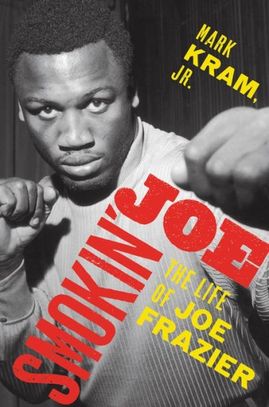SMOKIN' JOE

Former heavyweight champion Joe Frazier is usually considered the B-side of the saga of his contemporary, Muhammad Ali. Both men are gone now, Frazier having passed away in 2011 and Ali in 2016. Their trilogy of fights in the 1970s produced moments that will long outlive the protagonists.
Frazier won the first fight; Ali the second two. In the years following their retirement from the ring, Ali became an international icon, arguably the biggest celebrity of his time. You could fill a library with the books that have been written about him.
Frazier, on the other hand, was respected but always overshadowed by Ali's mega-fame. The books written about him could fill a good-sized bookshelf, but not a library. However, a new biography called Smokin' Joe: The Life of Joe Frazier is a welcome addition to that bookshelf.
Ironically, the book's author, Mark Kram Jr., is the son of the late Mark Kram, who wrote the 2001 volume Ghosts of Manila: The Fateful Blood Feud Between Muhammad Ali and Joe Frazier. The elder Kram's book uplifted Frazier and denigrated Ali, chopping big chunks from the latter's near-mythic image. Would the younger Kram use his Frazier biography as an axe to finish the job?
As it turns out, he does no such thing. Although Kram Jr. pulls no punches in delineating Frazier's bitterness and hatred toward his foe, he also reveals the extent of the wounds Ali inflicted with his taunts of "gorilla" and "Uncle Tom," amid other opprobrium. Frazier had a right to be angry.
In a different world, in which Ali had never become a fighter and America had kept out of Vietnam, Joe Frazier would have been revered as a working-class warrior and a rags-to-riches hero. And even in the world in which Ali and Vietnam existed, many people -- black and white alike -- did extol Frazier. His lethal left hook and take-no-prisoners aggression made him a popular box-office attraction.
But the voices of Ali's supporters were far louder, and that's what Joe heard. That's what seeped into his soul.
Kram's book, however, is more than an extended essay on the fraught relationship between Frazier and Ali. In addition, he hits the well-known tropes of other elements of Frazier's life: the rural poverty and racism he endured growing up in South Carolina; the urban poverty and racism that were his lot later on in Philadelphia; his discovery and nurturing as a boxer by manager Yancey "Yank" Durham and trainer Eddie Futch; his meteoric rise to the championship during the period of Ali's exile for refusing to drafted into the army; his up-and-down career after the Ali win; his post-retirement successes and failures.
Kram Jr. delves deeper into these tropes. For example, he lays bare the privations of living on a farm in the South, and the life-and-death necessity for Frazier to leave those surroundings. If he had truly been an "Uncle Tom," Frazier could have stayed down on the farm, and we would never have heard of him.
Frazier did have his foibles, and the book doesn't hide them. Though he was not an ostentatious spendthrift, he was also not always a wise investor. Like Ali, he was an inveterate womanizer, fathering a football team of children both in and out of wedlock. He tried to mold is son Marvis into a replica of himself, with disastrous results.
But bestriding Joe's life like a colossus was the icon and image of Muhammad Ali. With Ali silenced by the effects of Parkinson's disease, Frazier unleashed his buckets of vitriol at every opportunity. It was as though he wanted to defeat Ali again, as he had in their first fight. Unfortunately, in the process he made himself look bad,. Kicking a man while he's down is honorable only in mixed martial arts.
Eventually, Frazier showed signs of outward signs of mellowing. Appearing with Ali at events commemorating the anniversaries of their fights, Frazier seemed to show compassion for Ali's sadly reduced state.
But did Joe really feel that way? Or did he carry his grudge to his grave?
Kram Jr. provides a probable answer. At the end of his book, he tells of a final meeting between Frazier and Ali at Ali's house. The arch-rivals' reconciliation at that time appears genuine. Perhaps Frazier really did achieve final vindication in the face of Al's contrition.
Here's hoping that's the case. He deserves that outcome, just as he deserves a biography of the quality and magnitude of Smokin' Joe. Kram Jr. shows clearly that Joe Frazier was nobody's B-side -- not even Muhammad Ali's.